4 sept 2018
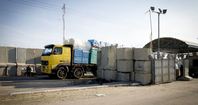
The Palestinian Businessmen Association (PBA) has warned that 90 percent of the economic activities in the besieged Gaza Strip will grind to a halt completely as a result of the financial and humanitarian shocks that have afflicted the population, especially after the US administration stopped funding UNRWA.
Head of the association Ali al-Hayek stated on Monday that thousands of Palestinian citizens in Gaza are threatened with unemployment during the current year as a result of the escalating blockade and the financial crisis that hit UNRWA.
Hayek affirmed that the unemployment rate among the refugees in Gaza would reach 65 percent by the end of 2018 if there was no clear funding program ending UNRWA’s financial crisis.
Head of the association Ali al-Hayek stated on Monday that thousands of Palestinian citizens in Gaza are threatened with unemployment during the current year as a result of the escalating blockade and the financial crisis that hit UNRWA.
Hayek affirmed that the unemployment rate among the refugees in Gaza would reach 65 percent by the end of 2018 if there was no clear funding program ending UNRWA’s financial crisis.
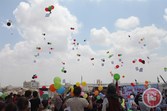
By: Ramzy Baroud
Ramzy Baroud is a journalist, author and editor of Palestine Chronicle. His latest book is The Last Earth: A Palestinian Story.
Israel wants to change the rules of the game entirely. With unconditional support from the Trump Administration, Tel Aviv sees a golden opportunity to redefine what has, for decades, constituted the legal and political foundation for the so-called "Palestinian-Israeli conflict."
While US President Donald Trump's foreign policy has, thus far, been erratic and unpredictable, his administration's "vision" in Israel and Palestine is systematic and unswerving. This consistency seems to be part of a larger vision aimed at liberating the "conflict" from the confines of international law and even the old US-sponsored "peace process."
Indeed, the new strategy has, so far, targeted the status of East Jerusalem as an Occupied Palestinian city, and the Right of Return for Palestinian refugees. It aims to create a new reality in which Israel achieves its strategic goals while the rights of Palestinians are limited to mere humanitarian issues.
Unsurprisingly, Israel and the US are using the division between Palestinian factions, Fatah and Hamas, to their advantage. Fatah dominates the Palestinian Authority (PA) in Ramallah while Hamas controls besieged Gaza.
A carrot and a stick scenario is being applied in earnest. While, for years, Fatah received numerous financial and political perks from Washington, Hamas subsisted in isolation under a permanent siege and protracted state of war. It seems that the Trump Administration - under the auspices of Trump's senior adviser and son-in-law, Jared Kushner - are turning the tables.
The reason that the PA is no longer the "moderate" Palestinian leadership it used to be in Washington's ever self-serving agenda is that Mahmoud Abbas has decided to boycott Washington in response to the latter’s recognition of all of Jerusalem as Israel's capital. True, Abbas' subservience has been successfully tested in the past but, under the new administration, the US demands complete "respect", thus total obedience.
Hamas, which is locked in Gaza between sealed borders from every direction, has been engaging Israel indirectly through Egyptian and Qatari mediation. That engagement has, so far, resulted in a short-term truce, while a long-term truce is still being discussed.
The latest development on that front was the visit by Kushner, accompanied with Middle East envoy, Jason Greenblatt, to Qatar on August 22. There, Gaza was the main topic on the agenda.
So, why is Gaza, which has been isolated (even by the PA itself) suddenly the new gate through which top US, Israeli and regional officials are using to reactivate Middle East diplomacy?
Ironically, Gaza is being particularly suffocated these days. The entire Gaza Strip is sinking deeper in its burgeoning humanitarian crisis, with August being one of the most grueling months.
A series of US financial aid cuts has targeted the very socio-economic infrastructure that allowed Gaza to carry on, despite extreme poverty and the ongoing economic blockade.
On August 31, Foreign Policy magazine reported that the US administration is in the process of denying the UN Palestinian refugees agency, UNRWA - which has already suffered massive US cuts since January - of all funds. Now the organization's future is in serious peril.
The worrying news came only one week after another announcement, in which the US decided to cut nearly all aid allocated to Palestinians this year – $200 million, mostly funds spent on development projects in the West Bank and humanitarian aid to Gaza.
So why would the US manufacture a major humanitarian crisis in Gaza - which suits the right-wing government of Benjamin Netanyahu well - while, simultaneously, engaging in discussions regarding the urgent need to end Gaza’s humanitarian woes?
The answer lies in the need for the US to manipulate aid to Palestinians in order to exact political concessions for Israel’s sake.
Months before rounds of Egyptian-sponsored indirect talks began between Israel and Hamas, there has been an unmistakable shift in Israeli and U.S. attitudes regarding the future of Gaza:
On January 31, Israel presented to a high-level conference in Brussels "humanitarian assistance plans" for Gaza at a proposed cost of $1 billion. The plan focuses mostly on water distillation, electricity, gas infrastructure and upgrading the joint industrial zone at the Erez crossing between Gaza and Israel. In essence, the Israeli plan is now the core discussion pertaining to the proposed long-term ceasefire.
The meeting was attended by Greenblatt, along with Kushner who is entrusted with implementing Trump's unclear vision, inappropriately termed the "Deal of the Century."
Two months later, Kushner hosted top officials from 19 countries to discuss the humanitarian crisis in Gaza.
Clearly, there is a common thread between all of these activities.
Since the US decided to defy international law and move its embassy from Tel Aviv to Jerusalem last December, it has been in search of a new strategy that will circumvent the PA in Ramallah.
PA President, Abbas, whose political apparatus is largely reliant on "security coordination" with Israel, US political validation and financial handouts, has little with which to bargain.
Hamas has relatively greater political capital – as it has operated with less dependency on the Israeli-US-western camp. But years of relentless siege, interrupted by massive deadly Israeli wars, have propelled Gaza into a permanent humanitarian crisis.
While a temporary truce between Israel and Hamas-led Palestinian groups in Gaza went into effect on August 15, a long-term truce is still being negotiated. According to the Israeli daily "Haaretz," citing Israeli officials, the truce would include a comprehensive ceasefire, opening all border crossings, expansion of the permitted fishing area off the Gaza coast, and the overhauling of Gaza’s destroyed economic infrastructure - among other stipulations.
Concurrently, Palestinian officials in Ramallah are fuming. "Chief negotiator," Saeb Erekat, accused Hamas of trying to "destroy the Palestinian national project," by negotiating a separate agreement with Israel. The irony is that the Fatah-dominated Palestine Liberation Organization (PLO) and PA have done just that for over 25 years.
However, delinking the future of Gaza from the future of all Palestinians can, indeed, lead to dangerous consequences.
Regardless of whether a permanent truce is achieved between Israel and the Hamas-led Gaza factions, the sad truth is that, whatever grand illusion is harbored by Washington and Tel Aviv at the moment, is almost entirely based on exploiting Palestinian divisions, for which the Palestinian leadership is to be wholly blamed.
Ramzy Baroud is a journalist, author and editor of Palestine Chronicle. His latest book is The Last Earth: A Palestinian Story.
Israel wants to change the rules of the game entirely. With unconditional support from the Trump Administration, Tel Aviv sees a golden opportunity to redefine what has, for decades, constituted the legal and political foundation for the so-called "Palestinian-Israeli conflict."
While US President Donald Trump's foreign policy has, thus far, been erratic and unpredictable, his administration's "vision" in Israel and Palestine is systematic and unswerving. This consistency seems to be part of a larger vision aimed at liberating the "conflict" from the confines of international law and even the old US-sponsored "peace process."
Indeed, the new strategy has, so far, targeted the status of East Jerusalem as an Occupied Palestinian city, and the Right of Return for Palestinian refugees. It aims to create a new reality in which Israel achieves its strategic goals while the rights of Palestinians are limited to mere humanitarian issues.
Unsurprisingly, Israel and the US are using the division between Palestinian factions, Fatah and Hamas, to their advantage. Fatah dominates the Palestinian Authority (PA) in Ramallah while Hamas controls besieged Gaza.
A carrot and a stick scenario is being applied in earnest. While, for years, Fatah received numerous financial and political perks from Washington, Hamas subsisted in isolation under a permanent siege and protracted state of war. It seems that the Trump Administration - under the auspices of Trump's senior adviser and son-in-law, Jared Kushner - are turning the tables.
The reason that the PA is no longer the "moderate" Palestinian leadership it used to be in Washington's ever self-serving agenda is that Mahmoud Abbas has decided to boycott Washington in response to the latter’s recognition of all of Jerusalem as Israel's capital. True, Abbas' subservience has been successfully tested in the past but, under the new administration, the US demands complete "respect", thus total obedience.
Hamas, which is locked in Gaza between sealed borders from every direction, has been engaging Israel indirectly through Egyptian and Qatari mediation. That engagement has, so far, resulted in a short-term truce, while a long-term truce is still being discussed.
The latest development on that front was the visit by Kushner, accompanied with Middle East envoy, Jason Greenblatt, to Qatar on August 22. There, Gaza was the main topic on the agenda.
So, why is Gaza, which has been isolated (even by the PA itself) suddenly the new gate through which top US, Israeli and regional officials are using to reactivate Middle East diplomacy?
Ironically, Gaza is being particularly suffocated these days. The entire Gaza Strip is sinking deeper in its burgeoning humanitarian crisis, with August being one of the most grueling months.
A series of US financial aid cuts has targeted the very socio-economic infrastructure that allowed Gaza to carry on, despite extreme poverty and the ongoing economic blockade.
On August 31, Foreign Policy magazine reported that the US administration is in the process of denying the UN Palestinian refugees agency, UNRWA - which has already suffered massive US cuts since January - of all funds. Now the organization's future is in serious peril.
The worrying news came only one week after another announcement, in which the US decided to cut nearly all aid allocated to Palestinians this year – $200 million, mostly funds spent on development projects in the West Bank and humanitarian aid to Gaza.
So why would the US manufacture a major humanitarian crisis in Gaza - which suits the right-wing government of Benjamin Netanyahu well - while, simultaneously, engaging in discussions regarding the urgent need to end Gaza’s humanitarian woes?
The answer lies in the need for the US to manipulate aid to Palestinians in order to exact political concessions for Israel’s sake.
Months before rounds of Egyptian-sponsored indirect talks began between Israel and Hamas, there has been an unmistakable shift in Israeli and U.S. attitudes regarding the future of Gaza:
On January 31, Israel presented to a high-level conference in Brussels "humanitarian assistance plans" for Gaza at a proposed cost of $1 billion. The plan focuses mostly on water distillation, electricity, gas infrastructure and upgrading the joint industrial zone at the Erez crossing between Gaza and Israel. In essence, the Israeli plan is now the core discussion pertaining to the proposed long-term ceasefire.
The meeting was attended by Greenblatt, along with Kushner who is entrusted with implementing Trump's unclear vision, inappropriately termed the "Deal of the Century."
Two months later, Kushner hosted top officials from 19 countries to discuss the humanitarian crisis in Gaza.
Clearly, there is a common thread between all of these activities.
Since the US decided to defy international law and move its embassy from Tel Aviv to Jerusalem last December, it has been in search of a new strategy that will circumvent the PA in Ramallah.
PA President, Abbas, whose political apparatus is largely reliant on "security coordination" with Israel, US political validation and financial handouts, has little with which to bargain.
Hamas has relatively greater political capital – as it has operated with less dependency on the Israeli-US-western camp. But years of relentless siege, interrupted by massive deadly Israeli wars, have propelled Gaza into a permanent humanitarian crisis.
While a temporary truce between Israel and Hamas-led Palestinian groups in Gaza went into effect on August 15, a long-term truce is still being negotiated. According to the Israeli daily "Haaretz," citing Israeli officials, the truce would include a comprehensive ceasefire, opening all border crossings, expansion of the permitted fishing area off the Gaza coast, and the overhauling of Gaza’s destroyed economic infrastructure - among other stipulations.
Concurrently, Palestinian officials in Ramallah are fuming. "Chief negotiator," Saeb Erekat, accused Hamas of trying to "destroy the Palestinian national project," by negotiating a separate agreement with Israel. The irony is that the Fatah-dominated Palestine Liberation Organization (PLO) and PA have done just that for over 25 years.
However, delinking the future of Gaza from the future of all Palestinians can, indeed, lead to dangerous consequences.
Regardless of whether a permanent truce is achieved between Israel and the Hamas-led Gaza factions, the sad truth is that, whatever grand illusion is harbored by Washington and Tel Aviv at the moment, is almost entirely based on exploiting Palestinian divisions, for which the Palestinian leadership is to be wholly blamed.
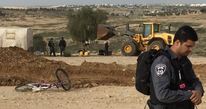
Israeli occupation forces demolished on Tuesday morning a Palestinian sheep breeding facility set up in Anata town, northeast of occupied Jerusalem.
Israeli municipal vehicles rolled into Anata town and destroyed a structure for raising livestock owned by the Palestinian farmer Mohammed al-Saray’a.
The occupation authorities claimed the demolition was carried out due to unlicensed construction.
Human rights data kept record of the demolition of 11 Palestinian residential, commercial and agricultural facilities in August. Another Palestinian was forced to reduce his own facility to rubble.
Israeli municipal vehicles rolled into Anata town and destroyed a structure for raising livestock owned by the Palestinian farmer Mohammed al-Saray’a.
The occupation authorities claimed the demolition was carried out due to unlicensed construction.
Human rights data kept record of the demolition of 11 Palestinian residential, commercial and agricultural facilities in August. Another Palestinian was forced to reduce his own facility to rubble.
3 sept 2018
|
|
Israeli bulldozers demolished a Palestinian-owned house, for the second time, in the Manshiyet Zabda village in northern Israel, on Monday.
Locals said that the Israeli authorities demolished the house a second time after residents of the area had rebuilt it following its first demolition. Sources pointed out that the house is inhabited by 15 people. Israeli bulldozers uprooted olive trees surrounding the house and razed the house to the ground after destroying its contents. Palestinian communities in Israel and occupied East Jerusalem have long been targeted by discriminatory Israeli policies, whether through "divide and conquer" tactics, attempts at forcibly displacing Bedouin communities, and what has been denounced as a policy of "Judaization" of Jerusalem at the expense of other religious communities. |
2 sept 2018
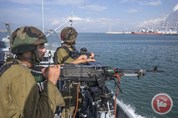
Israeli naval forces opened fire on a number of fishing boats and detained six Palestinian fishermen on Sunday in the besieged Gaza Strip.
According to local witnesses, Israeli naval forces detained six Palestinian fishermen in the central Gaza Strip as they were working within the permitted zone.
Witnesses identified the detainees as Zaki Ibrahim al-Najjar, Ahmad Mahmoud Abu Ryala, Mahmoud Jihad Abu Awda, Muhammad Jihad Abu Awda, Jihad Muhammad Abu Awda, and Muhammad Bahjat Abu Awda.
The reason for their detention remained unknown.
Several hours after the detention, Israeli naval forces opened fire on a number of Palestinian fishing boats in northern Gaza.
Sources added that Israeli naval forces continued to fire and chased down the fishing boats, forcing them to sail back to shore.
No injuries were reported.
As part of Israel's blockade of the coastal enclave since 2007, the Israeli army, citing security concerns, requires Palestinian fishermen to work within a limited "designated fishing zone," the exact limits of which are decided by the Israeli authorities and have historically fluctuated.
The Israeli army regularly detains and opens fire on unarmed Palestinian fishermen, shepherds, and farmers along the border areas if they approach the unilaterally declared buffer zone.
Israeli human rights group B’Tselem recently concluded that Israel’s Gaza closure and “harassment of fishermen” have been “destroying Gaza’s fishing sector,” with 95 percent of fishermen living below the poverty line.
According to local witnesses, Israeli naval forces detained six Palestinian fishermen in the central Gaza Strip as they were working within the permitted zone.
Witnesses identified the detainees as Zaki Ibrahim al-Najjar, Ahmad Mahmoud Abu Ryala, Mahmoud Jihad Abu Awda, Muhammad Jihad Abu Awda, Jihad Muhammad Abu Awda, and Muhammad Bahjat Abu Awda.
The reason for their detention remained unknown.
Several hours after the detention, Israeli naval forces opened fire on a number of Palestinian fishing boats in northern Gaza.
Sources added that Israeli naval forces continued to fire and chased down the fishing boats, forcing them to sail back to shore.
No injuries were reported.
As part of Israel's blockade of the coastal enclave since 2007, the Israeli army, citing security concerns, requires Palestinian fishermen to work within a limited "designated fishing zone," the exact limits of which are decided by the Israeli authorities and have historically fluctuated.
The Israeli army regularly detains and opens fire on unarmed Palestinian fishermen, shepherds, and farmers along the border areas if they approach the unilaterally declared buffer zone.
Israeli human rights group B’Tselem recently concluded that Israel’s Gaza closure and “harassment of fishermen” have been “destroying Gaza’s fishing sector,” with 95 percent of fishermen living below the poverty line.
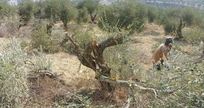
The Israeli civil administration Sunday threatened to uproot around 70 full-grown olive trees belonging to a Palestinian farmer in Khirbet al-Humma, in the northern Jordan Valley, under the pretext the land is an 'archaeological site.
Local activist Mutaz Besharat, who monitors settlement activity in the Tubas area, said staff from the Israeli civil administration handed the land owner a notice notifying him of their intentions to uproot around 70 olive trees.
The trees reportedly belong to Palestinian citizen Najeeb Faqha.
Local activist Mutaz Besharat, who monitors settlement activity in the Tubas area, said staff from the Israeli civil administration handed the land owner a notice notifying him of their intentions to uproot around 70 olive trees.
The trees reportedly belong to Palestinian citizen Najeeb Faqha.

Six Palestinian fishermen were arrested by the Israeli occupation navy on Saturday evening while saling off Deir al-Balah seashore, in the central Gaza Strip.
Gaza Fishermen’s Union said Israeli gunboats chased down a vessel owned by fisherman Mohamed Abu Reyala and kidnapped six Palestinians onboard.
Israel’s navy troops also seized the fishermen’s boat.
The six fishermen are identified as Zaki Abu Odeh, Ahmad Abu Reyala, Mahmoud Abu Odeh and his brother Mohamed, Jehad Abu Odeh, and Mohamed Abu Odeh.
Gaza Fishermen’s Union said Israeli gunboats chased down a vessel owned by fisherman Mohamed Abu Reyala and kidnapped six Palestinians onboard.
Israel’s navy troops also seized the fishermen’s boat.
The six fishermen are identified as Zaki Abu Odeh, Ahmad Abu Reyala, Mahmoud Abu Odeh and his brother Mohamed, Jehad Abu Odeh, and Mohamed Abu Odeh.
1 sept 2018
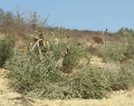
A number of extremist Israeli colonizers, from Yitzhar illegal colony which was built on private Palestinian lands, invaded an olive orchard and cut at least twenty trees.
Ghassan Daghlas, a Palestinian official who monitors Israel’s colonialist activities in northern West Bank, said a large number of colonizers invaded the orchard, owned by Zakariya Jamil Najjar and cut the trees.
He added that the invaded orchard is located between Burin Palestinian village and Yitzhar colony in the al-Mayadeen area.
The official also stated that dozens of colonizers invaded, Friday, various orchards in the area, including the attacked land.
Ghassan Daghlas, a Palestinian official who monitors Israel’s colonialist activities in northern West Bank, said a large number of colonizers invaded the orchard, owned by Zakariya Jamil Najjar and cut the trees.
He added that the invaded orchard is located between Burin Palestinian village and Yitzhar colony in the al-Mayadeen area.
The official also stated that dozens of colonizers invaded, Friday, various orchards in the area, including the attacked land.
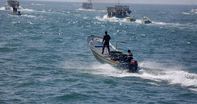
The Israeli occupation navy on Friday savagely attacked and opened machinegun fire at a group of Palestinian fishermen off the central and northern shores of the besieged Gaza Strip.
Local sources reported that Israeli gunboats tried to sink fishing during their presence within three nautical miles off the central coast of Gaza and kept attacking them with live ammunition and water cannons until they had to go ashore.
Earlier, fishermen reported their exposure to a similar attack off the northern shores of Gaza.
The fishermen said Israeli naval forces attacked them with live fire, forcing them to sail several nautical miles towards the southern part of Gaza in an attempt to avoid further assault, but the gunboat chased them.
The forces then intercepted and stopped the fishermen and sprayed them with water cannons, pushing one of them off the boat for an approximate distance of 12 meters.
The fisherman then swam back to the boat, while the navy sprayed it with more condensed water, damaging its engine and electronic equipment as well as all the cellphones belonging to the fishermen.
The navy then left the area, and the fishermen embarked on salvaging their boat before they managed to return to the shore.
Local sources reported that Israeli gunboats tried to sink fishing during their presence within three nautical miles off the central coast of Gaza and kept attacking them with live ammunition and water cannons until they had to go ashore.
Earlier, fishermen reported their exposure to a similar attack off the northern shores of Gaza.
The fishermen said Israeli naval forces attacked them with live fire, forcing them to sail several nautical miles towards the southern part of Gaza in an attempt to avoid further assault, but the gunboat chased them.
The forces then intercepted and stopped the fishermen and sprayed them with water cannons, pushing one of them off the boat for an approximate distance of 12 meters.
The fisherman then swam back to the boat, while the navy sprayed it with more condensed water, damaging its engine and electronic equipment as well as all the cellphones belonging to the fishermen.
The navy then left the area, and the fishermen embarked on salvaging their boat before they managed to return to the shore.
31 aug 2018
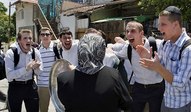
What might it look like to be a minority in an apartheid state that has spelled out your second-class status, sanctioned discrimination against you, and not-so-secretly wants to get rid of you? Here’s how that looks in Israel.
Israel’s new Nation State Law, just over 1 month old, has already increased the discrimination against Palestinians in Israel to absurd levels: they’re being prohibited from raising chickens, planting potatoes, gathering traditional herbs. Small sewing and knitting factories are being closed down and moved to Jordan. The only logical explanation: it’s part of a plan to make survival in Israel impossible, to initiate a “soft transfer” or “voluntary emigration” of Palestinians, because mass deportation – as in the Nakba – is no longer practical.
By Zuhair Andraus, Nazareth, Raialyoum; translated by Ziyad Shihadah
Israel is increasing its economic, political, and security siege on the 1.6 million Palestinians of 1948 – the Palestinians who make up 21% of Israel’s population. Its discriminatory policies have reached a level in which Palestinians are prevented from raising chickens and planting potatoes, small textile factories have been closed and transported to Jordan, and other products and ways of life have been impacted as well.
This is a racist phenomenon with the deliberate goal of “soft transfer” or “voluntary emigration” of Palestinians, because mass deportation – as in the Nakba – is no longer practical.
Help Wanted – with a catchBut before we get into the details, it must be noted that every job in Israel, whether governmental or non-governmental, has as a condition that the applicant has served in the occupation army, which clearly prevents the Arabs of 1948 from entering the labor force. This explains why Arabs undisputedly have the highest level of unemployment, and why 50% of Palestinian children at home live below the poverty line.
In addition to that, on the facades of many, many shops from the far north to the far south of the Jewish State, Help Wanted signs are posted for salespeople. In Eilat (Umm al-Rashrash), this writer saw a help wanted sign in an underwear shop with a requirement that the candidate has served in the occupation army.
What is the relationship of the army to underwear? Perhaps the answer can be found in the many advertisements by Jewish call girls. They say clearly what others hint at: “We do not welcome Arabs!” Of course there are clear obscene messages in public places, like “Arabjarrab” (Arabs are lepers) and other filthy insults and curses.
Chickens, eggs, and potatoesIn the context of the economic persecution of Palestinians, the Israeli Ministry of Agriculture lately decided to prohibit the 1948 Arabs from raising chickens. As a result, they prevented them from obtaining eggs, asserting that this product should come only from Jews in the moshavim (cooperative villages) . Within days, Arab eggs disappeared from the markets and were replaced by Israeli eggs, which came from moshavim built on the ruins of Palestinians villages destroyed since the Nakba.
Israeli authorities also issued a law forbidding Arabs to plant potatoes, thanks to pressure from Israel’s large potato farmers – after authorities discovered that potato cultivation is inexpensive and that potatoes are a valuable source of income for Palestinians. The eggs and potatoes are examples of the institutional racism in the Jewish state.
No more free thyme
Israel’s new Nation State Law, just over 1 month old, has already increased the discrimination against Palestinians in Israel to absurd levels: they’re being prohibited from raising chickens, planting potatoes, gathering traditional herbs. Small sewing and knitting factories are being closed down and moved to Jordan. The only logical explanation: it’s part of a plan to make survival in Israel impossible, to initiate a “soft transfer” or “voluntary emigration” of Palestinians, because mass deportation – as in the Nakba – is no longer practical.
By Zuhair Andraus, Nazareth, Raialyoum; translated by Ziyad Shihadah
Israel is increasing its economic, political, and security siege on the 1.6 million Palestinians of 1948 – the Palestinians who make up 21% of Israel’s population. Its discriminatory policies have reached a level in which Palestinians are prevented from raising chickens and planting potatoes, small textile factories have been closed and transported to Jordan, and other products and ways of life have been impacted as well.
This is a racist phenomenon with the deliberate goal of “soft transfer” or “voluntary emigration” of Palestinians, because mass deportation – as in the Nakba – is no longer practical.
Help Wanted – with a catchBut before we get into the details, it must be noted that every job in Israel, whether governmental or non-governmental, has as a condition that the applicant has served in the occupation army, which clearly prevents the Arabs of 1948 from entering the labor force. This explains why Arabs undisputedly have the highest level of unemployment, and why 50% of Palestinian children at home live below the poverty line.
In addition to that, on the facades of many, many shops from the far north to the far south of the Jewish State, Help Wanted signs are posted for salespeople. In Eilat (Umm al-Rashrash), this writer saw a help wanted sign in an underwear shop with a requirement that the candidate has served in the occupation army.
What is the relationship of the army to underwear? Perhaps the answer can be found in the many advertisements by Jewish call girls. They say clearly what others hint at: “We do not welcome Arabs!” Of course there are clear obscene messages in public places, like “Arabjarrab” (Arabs are lepers) and other filthy insults and curses.
Chickens, eggs, and potatoesIn the context of the economic persecution of Palestinians, the Israeli Ministry of Agriculture lately decided to prohibit the 1948 Arabs from raising chickens. As a result, they prevented them from obtaining eggs, asserting that this product should come only from Jews in the moshavim (cooperative villages) . Within days, Arab eggs disappeared from the markets and were replaced by Israeli eggs, which came from moshavim built on the ruins of Palestinians villages destroyed since the Nakba.
Israeli authorities also issued a law forbidding Arabs to plant potatoes, thanks to pressure from Israel’s large potato farmers – after authorities discovered that potato cultivation is inexpensive and that potatoes are a valuable source of income for Palestinians. The eggs and potatoes are examples of the institutional racism in the Jewish state.
No more free thyme
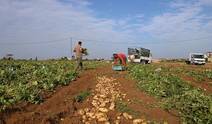
Potatoes have always been an important cash crop for Palestinian farmers – but in a moment’s time, their clientele has dried up: now that it is perfectly acceptable to discriminate in Israel, Israeli potato farmers have demanded all of the action, and gotten it.
It is well known that Palestine is a fertile agricultural land, rich in many types of plants that grow in the wild. Some of these, such as thyme and hibiscus, are harvested and used by Palestinians for food, but not known or eaten by Jews.
The Israeli government has recently instructed the so-called “Nature Protection Authority” to declare that these plants are on a list of “protected” plants, and that those who harvest them are breaking the law.
At the same time, many Jewish merchants who discovered the importance of these plants for Palestinians have applied to the Israeli Ministry of Agriculture for the necessary permits to grow these plants and then sell them in Arab markets. Thus, the Palestinian has become a profitable market for Israeli trade for a product that used to be available for free.
Tobacco and textiles are out
It is well known that Palestine is a fertile agricultural land, rich in many types of plants that grow in the wild. Some of these, such as thyme and hibiscus, are harvested and used by Palestinians for food, but not known or eaten by Jews.
The Israeli government has recently instructed the so-called “Nature Protection Authority” to declare that these plants are on a list of “protected” plants, and that those who harvest them are breaking the law.
At the same time, many Jewish merchants who discovered the importance of these plants for Palestinians have applied to the Israeli Ministry of Agriculture for the necessary permits to grow these plants and then sell them in Arab markets. Thus, the Palestinian has become a profitable market for Israeli trade for a product that used to be available for free.
Tobacco and textiles are out

Tobacco is another crop important to economic survival for Palestinian farmers – which makes it an excellent target for those seeking to ruin them.
In this context, the occupation authorities found another outlet to narrow the economic space to the Palestinians, with the Dubek, the only Israeli cigarette producer, stopped purchasing tobacco from Arab farmers. Keep in mind that tobacco is one of the main cash crops for Palestinians in the Galilee (West Bank), within the so-called “Green Line.” Thus, Israel has eliminated the market for one of the most important Arab agricultural products in Palestine. Instead of Arab tobacco, Israel has turned to its ally Turkey, and is importing Turkish tobacco.
To make things even worse in the economic war against the Palestinians – and in cooperation with Jordan – Israel recently closed a number of small sewing and knitting factories in the Galilee, the Triangle (a cluster of Israeli Arab villages near the Green Line), and the Negev areas. These factories, the source of income for a large number of Palestinian families, are now being moved to Jordan with the excuse of cheap labor. It is rumored that this is an attempt to support Jordan’s fragile economy, but clearly the occupation wants to cut off income sources of the 1948 Arabs.
And on and on
It is worth mentioning that Israel’s economically strangling policies to date have led to a 33% unemployment rate in the Negev and Umm al-Fahm, and widened the employment gap between Palestinians and Israelis: unemployment among Palestinians reached 25%, vs. 6.5% among Israelis.
To illustrate the depth of Israeli racism, it is enough to point to the humiliation the 1948 Arabs face during Israeli airport searches and unnecessary, inciting investigations. In addition, the Israeli Prime Minister’s Office does not employ even one Arab; homes are demolished; towns and villages are not allowed to expand and build. Finally, Israeli trains do not pass through any Arab cities or towns inside Palestinian land.
In this context, the occupation authorities found another outlet to narrow the economic space to the Palestinians, with the Dubek, the only Israeli cigarette producer, stopped purchasing tobacco from Arab farmers. Keep in mind that tobacco is one of the main cash crops for Palestinians in the Galilee (West Bank), within the so-called “Green Line.” Thus, Israel has eliminated the market for one of the most important Arab agricultural products in Palestine. Instead of Arab tobacco, Israel has turned to its ally Turkey, and is importing Turkish tobacco.
To make things even worse in the economic war against the Palestinians – and in cooperation with Jordan – Israel recently closed a number of small sewing and knitting factories in the Galilee, the Triangle (a cluster of Israeli Arab villages near the Green Line), and the Negev areas. These factories, the source of income for a large number of Palestinian families, are now being moved to Jordan with the excuse of cheap labor. It is rumored that this is an attempt to support Jordan’s fragile economy, but clearly the occupation wants to cut off income sources of the 1948 Arabs.
And on and on
It is worth mentioning that Israel’s economically strangling policies to date have led to a 33% unemployment rate in the Negev and Umm al-Fahm, and widened the employment gap between Palestinians and Israelis: unemployment among Palestinians reached 25%, vs. 6.5% among Israelis.
To illustrate the depth of Israeli racism, it is enough to point to the humiliation the 1948 Arabs face during Israeli airport searches and unnecessary, inciting investigations. In addition, the Israeli Prime Minister’s Office does not employ even one Arab; homes are demolished; towns and villages are not allowed to expand and build. Finally, Israeli trains do not pass through any Arab cities or towns inside Palestinian land.
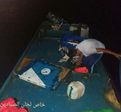
An Israeli navy ship fired, on Thursday evening, live rounds at a Palestinian fishing boat in the Sudaniyya Sea area, west of Gaza city, causing serious damage to the boat, in addition to spraying the fishermen and their boat with water cannons.
The fishermen said the navy attacked them with live fire, forcing them to sail several nautical miles towards the southern part of the Gaza Strip in an attempt to avoid further assaults, but the navy chased them.
The navy then stopped the fishermen and ordered them to stand at the edge of the boat before spraying them with water cannons, pushing one of them, identified as Misbah Nafeth Salah, off the boat for an approximate distance of twelve meters.
The fisherman then swam toward the boat, while the navy sprayed it with more condensed water, damaging its engine and GPS system.
The navy then left the area, and the fishermen started trying to salvage their boat, and managed to get back to the shore.
The fishermen said the navy attacked them with live fire, forcing them to sail several nautical miles towards the southern part of the Gaza Strip in an attempt to avoid further assaults, but the navy chased them.
The navy then stopped the fishermen and ordered them to stand at the edge of the boat before spraying them with water cannons, pushing one of them, identified as Misbah Nafeth Salah, off the boat for an approximate distance of twelve meters.
The fisherman then swam toward the boat, while the navy sprayed it with more condensed water, damaging its engine and GPS system.
The navy then left the area, and the fishermen started trying to salvage their boat, and managed to get back to the shore.
30 aug 2018
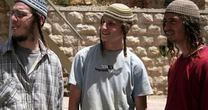
Extremist Israeli settlers have been raking through Palestinian lands in Nablus and Ramallah, paving the way for more attacks against Palestinians and their property, an activist has warned.
Ghassan Dughlas, who monitors settlement activity in the northern occupied West Bank, said settler gangs have showed up on Palestinian land located between Yitzhar outpost, south of Nablus, and Shilo, north of Ramallah.
The activist said over recent months, Israeli settlers stepped up assaults against Palestinian farmers and agricultural facilities in the occupied West Bank in the presence of the Israeli army.
Dughlas also warned of increasing attacks by Israeli settlers against Palestinians driving on bypass roads leading to Israeli settlements, namely Yitzhar.
Recently, Israeli settlers set up five mobile homes near Shilo settlement, paving the way for illegal settlement expansion on Palestinian land in the area, the activist added.
Ghassan Dughlas, who monitors settlement activity in the northern occupied West Bank, said settler gangs have showed up on Palestinian land located between Yitzhar outpost, south of Nablus, and Shilo, north of Ramallah.
The activist said over recent months, Israeli settlers stepped up assaults against Palestinian farmers and agricultural facilities in the occupied West Bank in the presence of the Israeli army.
Dughlas also warned of increasing attacks by Israeli settlers against Palestinians driving on bypass roads leading to Israeli settlements, namely Yitzhar.
Recently, Israeli settlers set up five mobile homes near Shilo settlement, paving the way for illegal settlement expansion on Palestinian land in the area, the activist added.
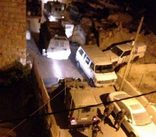
The Palestinian Prisoners’ Society (PPS) has reported that Israeli soldiers abducted, on Thursday at dawn, three Palestinians, including two children, in the West Bank governorate of Bethlehem.
The Bethlehem office of the PPS said dozens of soldiers invaded Beit Fajjar town, south of the city, searched several homes and abducted Khaled Mohammad Taqatqa, 17, Sanad Majed Taqatqa, 16, and Sharif Mohammad Sbeih, 20.
Ahmad Salah, the coordinator of the Popular Committee against the Annexation Wall and Colonies in al-Khader, said the soldiers also detonated doors leading to a medical storage facility in the town, and search it.
The Bethlehem office of the PPS said dozens of soldiers invaded Beit Fajjar town, south of the city, searched several homes and abducted Khaled Mohammad Taqatqa, 17, Sanad Majed Taqatqa, 16, and Sharif Mohammad Sbeih, 20.
Ahmad Salah, the coordinator of the Popular Committee against the Annexation Wall and Colonies in al-Khader, said the soldiers also detonated doors leading to a medical storage facility in the town, and search it.
Page: 28 - 27 - 26 - 25 - 24 - 23 - 22 - 21 - 20 - 19 - 18 - 17 - 16 - 15 - 14 - 13 - 12 - 11 - 10 - 9 - 8 - 7
